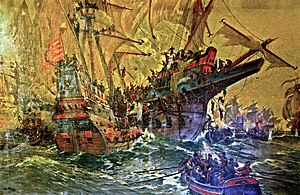First battle of Öland (1564)
| Action of 30 May 1564 | |||||||||
|---|---|---|---|---|---|---|---|---|---|
| Part of Northern Seven Years' War | |||||||||
 Final battle at Mars, by Hans Bohrdt | |||||||||
| |||||||||
| Belligerents | |||||||||
|
|
| ||||||||
| Commanders and leaders | |||||||||
|
|
| ||||||||
| Strength | |||||||||
|
|
| ||||||||
| Casualties and losses | |||||||||
|
|
| ||||||||
The first battle of Öland (Swedish: Första slaget vid Ölands norra udde) took place on 30–31 May 1564 between the islands of Gotland and Öland, between a fleet of Allied ships, the Danes under Herluf Trolle and the Lübeckers under Friedrich Knebel, and a Swedish fleet of 23 or more ships under Jakob Bagge. It was an Allied victory.
Only some of the ships on each side were involved, the rest being unable to help due to the wind. On 30 May Fortuna was damaged and Lange Bark sunk, but on 31 May the Swedish ship Mars was boarded by Byens Løffue, Engel, and Fuchs before catching alight and exploding, killing most of its crew and 300 boarders. Jakob Bagge and his Second, Arved Trolle, were taken prisoner. Swedish casualties apart from in this ship were 101. Fleming took over the fleet and sailed it back to Älvsnabben, while the Danes sailed to Copenhagen.
Ships involved
Denmark/Lübeck
- Fortuna (Danish flag)
- Byens Løffue 56
- Engel (Lübeck flag)
- Lange Bark (Lübeck) — sunk 30 May
- Arck
- Fuchs (Lübeck)
- other ships
Sweden
- Mars 173 (flag) — blew up 31 May
- Elefant 65 (Fleming)
- Finska Svan 82
- Svenska Hektor 87
- 19 or more other ships
References
- Kloth, Herbert: "Lübecks Seekriegswesen in der Zeit des nordischen 7-jährigen Krieges 1563–1570", Zeitschrift des Vereines für lübeckische Geschichte und Altertumskunde, Vol. 21 (1923), pp. 1–51, 185–256 plus Vol. 22 (1923–25), pp. 121–52 & 325–79
External links